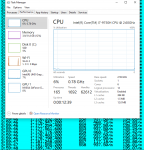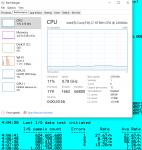Sorry air-scan, I'm dragging this one out of the crypt...
Just ran into this problem today with a machine that only has USB 3.1 ports. Plugged in one of my FlightAware dongles, did the driver update with Zadig and had FMP24/DSD+ working fine for a while on the local Phase II PS system. But after maybe 15 minutes, the audio got really bad. Pressed L in FMP24 and it immediately started reporting lost I/Q samples. Shut down FMP24 and DSD+ and tried rtl_test (32 and 64 bit versions); they both reported near-continuous errors.
Messed around with Windows power plan settings, then BIOS settings, then updated a bunch of out of date hardware drivers. Still got lots of errors for dropped I/Q samples.
Then, while still getting I/Q stream errors, I started a very large unzipping job (data transfer to new machine). The errors immediately stopped. Go figure.
What seems to be happening is that rtl_test, FMP24 and DSD+ all use so little resources that the power saving gremlins are kicking in and messing up USB transfers. When the CPU usage graph in Windows Task Manager is raised to about 10%, I'm seeing about one lost samples event every minute, which is isn't going to cause any noticeable decoding issues. So the other decoders avoid this by keeping the machine warm?
Light CPU load (2%), massive errors (more than two stream dropouts *per second*):
View attachment 102233
Moderate CPU load (9-10%), about one stream dropout per *minute*:
View attachment 102234
Same *everything* except for me firing up a simple CPU cooker. It doesn't do anything but make some random integer calculations. No network I/O, no disk accesses, no screen output, no GPU, nada.
I guess I just need to run enough dongles and FMP24/DSD+ pairs to keep the CPU warm. Unbelievable...




